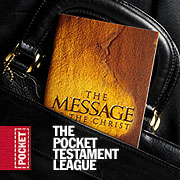|
Day 228: Fruit That Will LastActs 16:1-2
[Speaking of Paul's second missionary trip with Silas] He came to Derbe and then to Lystra, where a disciple named Timothy lived, whose mother was a Jewess and a believer, but whose father was a Greek. The brothers at Lystra and Iconium spoke well of him. Thoughts for Today:Paul now returns to Derbe and then Lystra; to the same people who had stoned him while on his first missionary journey. I wonder if he wasn't just a little wary considering how quickly the crowd had turned ugly which almost cost him his life. But five years had passed and his ministry had taken hold in the hearts of the people, as evidenced in the life of a young disciple named Timothy. Jesus tells us in John 15:16, "I chose you and appointed you to go and bear fruit -- fruit that will last..." Paul has seen this Scripture become real in Timothy. You see the real test for us is not how many people we can baptize on Sunday, but rather how many people's lives are changed and who are still in service to the Lord -- ten, fifteen, and twenty years later -- fruit that lasts. Questions to Ponder:Can you name three young people in whom you have invested? If you can't, get out a sheet of paper and start making a list. There is nothing more rewarding in this life than when a young person returns years later, and allows you to see in them evidence of a seed of faith you planted that has now grown into "fruit that will last." How do you get started? You might want to start by walking out your front door and meeting the kids in your neighborhood. Kids love adults who are friendly and smile a lot. Try it. Next, help out at Sunday school, volunteer in the nursery, or the youth group. Every church has multiple events to reach un-churched youth; all you have to do is be willing to help. How will you invest in a young person today? Going With What Seems RightActs 15:23-28
With them they sent the following letter: The apostles and elders, your brothers, To the Gentile believers in Antioch, Syria and Cilicia: Greetings. We have heard that some went out from us without our authorization and disturbed you, troubling your minds by what they said. So we all agreed to choose some men and send them to you with our dear friends Barnabas and PaulÑ men who have risked their lives for the name of our Lord Jesus Christ. Therefore we are sending Judas and Silas to confirm by word of mouth what we are writing. It seemed good to the Holy Spirit and to us not to burden you with anything beyond the following requirements... Thoughts for Today:Thursdays are trash days in our neighborhood. Fortunately the gardener comes on Wednesday, so he kindly takes the two recycling and one waste bins out to the street for me. On this particular Thursday morning I was running late and of course my wife asked me, just as I'm about to leave, to make sure I've taken out the household trash. I grabbed the two trash bags we keep in the kitchen, ran out to the street, threw them in the recycling bin, jumped in my car, and raced off. Half way down the street I realized one of the trash bags was recycling, but the other was waste and I had put them both in the recycling bin. I thought to myself, "its okay; one little waste bag with the recycling won't matter much; I'm not the only man in America who will make this mistake today; don't be obsessive; its okay." The Spirit sends me a quote, "Character is revealed under pressure," and I'm under severe time pressure, so what character am I displaying? I stopped the car, turned around, got the trash in the right receptacles, and then went back to my day. Did it matter that I was three minutes later than I would have been had I not stopped? Maybe, but probably not; however, doing the right thing each and every time I have a choice makes a difference to me and who I am in Christ. Its one small way the Lord gives us to model our faith. Certainly there are times like the one I just described when doing the right thing is absolute -- we just don't want to do it because it is inconvenient, difficult or costly. You will know these types of decisions because they always have a component of truth, integrity, honesty, etc, attached to them. The only confusion comes in when we are tempted to give in to our sinful nature. I heard it once said, "Integrity is what you do when no one else is watching." Most decisions regarding character and integrity are clear cut and simple -- we may not always like the answer but we will know the right thing to do. Other times the right answer will only seem to be the right answer. In our passage today, the Apostles and elders were faced with one of those decisions. I find it interesting that these men, pillars of Christianity, who would become authors of most of the New Testament, many of whom had known Jesus personally, would write summarizing their decision, "It seemed good to the Holy Spirit and to us." In other words, if the Holy Spirit did not speak to them against their decision so it must be okay. One of the more difficult aspects of Christianity is "knowing" if the decision we are about to make is the right one. So how do we know for sure which direction is really God's will? The answer, as unsettling as it might be is we won't always know for sure -- sometimes there aren't absolutes -- we are forced to go with what seems good to the Spirit and to us. Questions to Ponder:Many times God leaves decisions up to us and our personal preferences. God did not make us to be robots, mechanically doing His will. If God made each of us uniquely in His image, why do I see so many Christians bound up and tortured with decision making, afraid to make a mistake? Let's take character and integrity issues out of the equation because those decisions are clear cut (even if you don't want to admit it). That leaves us with personal preferences. Which mean, for example: Do I like this job offer? Do I like the work environment? Do I like the boss or new responsibilities? So many Christians confuse themselves with decisions while waiting for God to magically speak His will. Have you ever considered He has spoken His will by giving you an opportunity and it is now your personal preference and choice? He is waiting for you to choose. Causing FrictionActs 15:17b-18
[James speaking] "Instead we should write to them, telling them to abstain from food polluted by idols, from sexual immorality, from the meat of strangled animals and from blood. For Moses has been preached in every city from the earliest times and is read in the synagogues on every Sabbath." Thoughts for Today:James is saying that if the Law through Moses had the power to save, it would have already done so, "For Moses has been preached in every city from the earliest times and is read in the synagogues on every Sabbath." He also says, "Instead we should write to them, telling them to abstain from food polluted by idols, from sexual immorality, from the meat of strangled animals and from blood." When you look at this list (food polluted by idols, sexual immorality, meat of strangled animals, and blood), you might think it odd that sexual immorality would be included with the rest, and to a certain degree it is because it deals with a moral issue while the other three are about sensitivity to the Jewish culture. I think James is really saying, "If Gentile believers would abstain from these things, then they would not only please God, but also get along better with us, their Jewish brothers and sisters." I'm sure the Gentile believers were participating in other inappropriate activities; however these were the big four. This compromise, (one of the reasons James is known as James the Just) allowed the church to grow without the constant friction of major cultural differences between the Jews and the Gentiles. Paul teaches in 1 Corinthians 10:23, "Everything is permissible, but not everything is beneficial." He then further explains in verses 31-32, "So whether you eat or drink or whatever you do, do it all for the glory of God. Do not cause anyone to stumble, whether Jew, Gentile or the church of God." Many times when we violate another person's sensitivity by exercising our own personal freedom, we cause another to stumble; which can lead to friction and a rift within the body of Christ. This is the issue that James and later Paul were addressing. Questions to Ponder:Is there a behavior that another Christian displays that really rubs you the wrong way? Does the Bible prohibit this behavior? Could it be that you need to be more tolerant of another's expression of their God given freedom? Let's say instead others are offended by something you do that you believe is not prohibited by Scripture -- "everything is permissible but not everything is beneficial." Is what you're doing "for the glory of God"? Is it beneficial? Do you need to re-think your approach? We Should Not Make it DifficultActs 15:17b-18
[James speaking] "It is my judgment, therefore, that we should not make it difficult for the Gentiles who are turning to God." Thoughts for Today:A few Sundays ago after church, my wife, daughter and I went to a restaurant for a late breakfast. After we sat down and ordered our food, my wife Sherry proceeded to tell me that Amanda had not been the picture of obedience over the last week. It seemed that our daughter had become a little sassy (her mother's term). Rather than reading or cleaning her room when she was told, instead she had been somewhat argumentative and resistant. For those of you who know my daughter you know this is not typical behavior. After some discussion (including Scripture and prayer), we all agreed that the only right answer would be, "Yes mommy" when her mother asked her to do something. Later that day as my wife and I talked about it further in private, I realized the problem wasn't as simple as a little defiance (which is pretty normal in raising children). What we were really dealing with was my lack of presence, involvement, and participation recently. You see I have been wrestling for the past few weeks with a very significant business problem, and rather than resting in the Lord I have instead allowed myself to get caught up in worry. I don't know about you, but when I'm worried about a problem, playing with my daughter is not at the top of my list. It is interesting when after receiving this revelation and returning to my normal roles of husband, father and friend, how quickly Amanda returned to her normal obedient and happy self. When I decided to let God be God and once again do the job God gave me do (worry was not part of the job description), everything went back to normal. When I read our passage today, my cheeks flushed a little bit because I heard James say to me personally, "Your behavior is making it difficult for Amanda to be obedient." It's sometimes difficult to realize and admit that our behavior might be the source of another's problem. Questions to Ponder:Do you know someone who is "turning to God" (even if it is ever so slightly)? Have you erected a false barrier (like the Jews and their requirement for circumcision) that is making the turn difficult? Have you considered that your behavior might be the problem? Take a long hard look at yourself, what is God telling you that needs to change right now to improve your witness? Do you need to stop worrying, model your faith in action not just words, and truly let God be God? Monday, August 10, 2015
SHARE READ ONLINE In Touch with Dr. Charles Stanley Proven Faith 1 Peter 1:3-9 Faith is perhaps the most central element in the Christian life because it is the means by which we enter into salvation. But that’s only the beginning. From then onward, our faith—or lack of it—shapes our lives and determines what happens to us when the winds of adversity blow. Some Christians never lose their footing even in hurricane-force winds, but others are toppled by the slightest gust. To understand why this is true, we need to examine the source of our faith. Inherited faith: If you grew up in a Christian home, you probably adopted some of the beliefs of your parents. This kind of godly foundation is a wonderful gift from the Lord, but eventually, each person must assume responsibility for his own beliefs. Textbook faith: The Bible is the ultimate guide for establishing our beliefs. But that’s not the only source of influence. Books, preachers, teachers, and friends all impact our convictions. Our theology may in fact be sound, but faith is merely mental acceptance until it’s put to the test. Proven Faith: Only when we trust the Lord through the fires of adversity will we have faith that can stand. It is no longer based on what others have told us or what we’ve accepted as true but on our firsthand experience of His faithfulness. To evaluate your faith, consider how you react to adversity. Do you cling to the Lord or get angry at Him? Is your attitude one of rejoicing because He’s making you more like His Son, or are you bitter? No one can escape adversity, but those with proven faith will benefit from it. For more biblical teaching and resources from Dr. Charles Stanley, please visit www.intouch.org. Used with permission from In Touch Ministries, Inc. © 2009 All Rights Reserved. Proverbs 10:17-18
Nobody likes criticism. It’s often unsolicited and rarely fun. Many times, we reject our critic’s words because of the harsh spirit in which they are spoken. Yet God can take even a wrong attitude, bad timing, or harsh tone of voice and still tell us something we need to hear. That’s why we are wise to pay attention when someone critiques us. Invited or not, criticism forces us to examine ourselves and take notice of weak areas. This helps us discover who we really are and avoid unnecessary mistakes. If we fail to listen, our potential for mental, emotional, and spiritual growth is limited. While not all opinions are valid, it’s important to respond well and evaluate criticism correctly. First, do not immediately reject the comment, blame the person, or defend yourself. Instead, consider what was said and ask God if He’s trying to tell you something. Then, thank the person for his interest in your growth, and explain that you’ll reflect on his observation. If he was sincere, he’ll be appreciative, but if his intentions were negative, this will disarm him. Next, evaluate the criticism and determine what exactly is under scrutiny—your beliefs, your character, your behavior, or God? Finally, view this as an opportunity for growth, and, if necessary, apologize to the person you’ve offended. Jesus died on the cross for our sake, so we as believers are certain of His approval. When we remember this, the disapproval of others will take on less significance and cause less hurt. Then, as we learn to respond correctly, we will be blessed to find ourselves growing. Bible in One Year: Jeremiah 4-5 Holy Spirit Convicts Me of What? - Michael Edwards
"And He, when He comes, will convict the world concerning sin and righteousness and judgment" John 16:8 NASB For many years as a Christian I was told that based on Jesus words to his disciples in John 16:8, the Holy Spirit convicts us of our sins. However if we read verses 9-11, we see that Jesus thankfully took the time to expound on and clarify exactly what he meant. "concerning sin (singular sin), because they do not believe in Me;and concerning righteousness, because I go to the Father and you (believer) no longer see Me; and concerning judgment, because the ruler of this world has been judged. " John 16: 8-11 NASB So we learn directly from Jesus that the Holy Spirit convicts non-believers of the singular sin of unbelief. He also convicts believers, but not of sin, of righteousness (our right standing with God). In verse eleven we see the Holy Spirit also convicts satan of his judgment. The Greek word for convict is elégxō. It is defined: to convincewith solid, compelling evidence. Are you convinced that you are righteous in Christ? These verses also enforce another crucial truth. The contrast we see between a person who is convicted of sin versus a person convicted of righteousness is predicated solely on what is believed about Jesus. We are without doubt the righteousness of God in Christ Jesus. Thank you Father for sending the Holy Spirit (our comforter and advocate) to convince us with solid and compelling evidence of our right standing with you solely through our belief in Jesus. He made Him who knew no sin to be sin on our behalf, so that we might become the righteousness of God in Him. 2Cor 5:21 NASB |
For God so loved the world…..and especially youMinister Archives
March 2022
Categories |
| Walking with the Master Ministries |
|





 RSS Feed
RSS Feed
